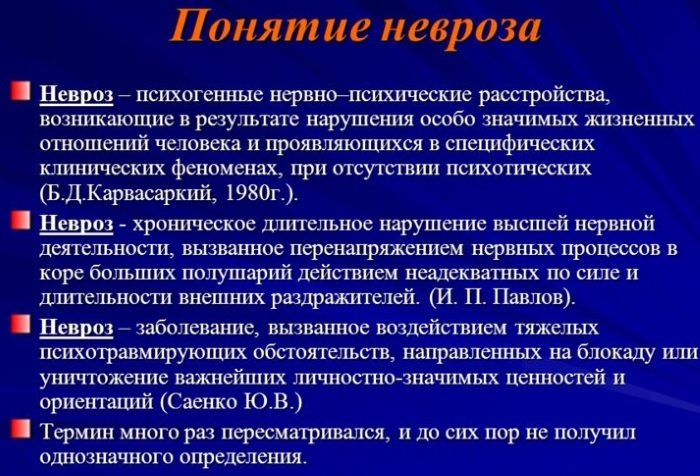Content
- Why is sleep so important and why is it needed?
- How sleep works
- Daily cyclicity
- Circadian rhythm
- Sleep structure
- Slow sleep
- REM sleep
- What happens in the body during sleep
- How much sleep a day, depending on age, at what time
- Sleep neuroanatomy
- What affects sleep?
- Age-related changes in sleep
- Artificial lighting
- Sleep hygiene
- Effect of sleep on vital functions
- Sleeping off on weekends
- Sleep deprivation
- Labor productivity
- What are sleep pathologies and how to deal with them
- Sleep videos
Sleep is an integral part of life. He needed to rest and recuperate the body. However, not every person knows what it is needed for, how it works, what is its structure, additional functions.
Why is sleep so important and why is it needed?
Sleep is given a special place among the rules of a healthy lifestyle, since it is an important tool for restoring the body, without which a person cannot live for more than 1-2 weeks.
Lack or lack of sleep can lead to a variety of health problems and increase your risk of developing many diseases:
- deterioration in general health and condition;
- decreased cognitive abilities - memory impairment;
- the development of chronic fatigue;
- decreased activity;
- change in appearance.

Also, a lack of nighttime rest can significantly increase the risk of cardiovascular diseases, diabetes mellitus, psychosomatic disorders or cause problems with excess body weight.
How sleep works
It is believed that sleep in a person's life takes about 1/3 of his entire life. Through brain research, scientists have come to the conclusion that circadian rhythms and homeostasis are the main tools for managing sleep.
Moreover, both factors are determined by the genetic characteristics of each person.
Daily cyclicity
The cyclicality of the day is involved in human biorhythms or sleep-wake modes. These processes occur as a result of the accumulation of special substances in the cerebrospinal fluid.
The most well-known substance is adenosine, which accumulates throughout the waking cycle. During sleep, its level decreases sharply.
ATP (adenosine triphosphate) is needed to provide the body with enough energy to be spent throughout the day.
With an excessive accumulation of adenosine in the body, biological processes occur that make many systems fall asleep, which makes a person fall asleep.
Circadian rhythm
How sleep works and why it is needed is constantly being studied by researchers around the world. The circadian rhythm is a built-in internal biological clock of a person. It is a small area located in the hypothalamus (left and right hemispheres).
In this area there are about 20 thousand. nerve cells (neurons) that transmit signals to various systems in the body. Moreover, each neuron has its own biological rhythms, which are equal to 24 hours.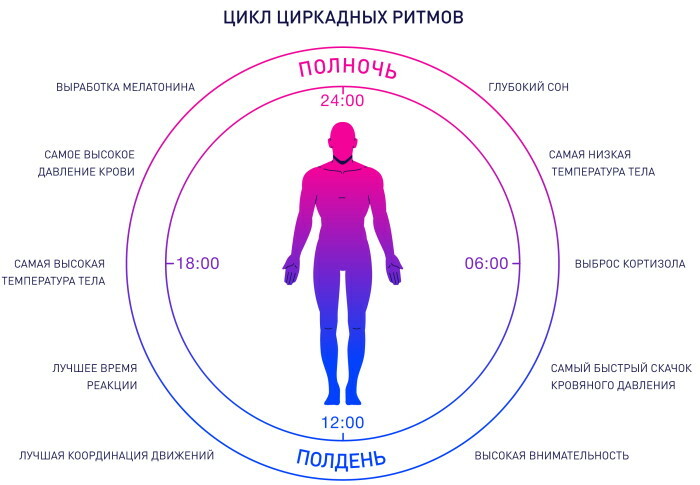
Circadian rhythms work in accordance with the environment and are synchronized based on darkness and light. However, they can work independently without any coordination with the environment.
However, such long-term discrepancy can lead to disruptions in rhythms and cause some problems.
It is believed that about 20% of all people have genetic characteristics that allow them to be so-called larks or owls. These conditions are not a violation and, when circadian rhythms change, can adversely affect a person's condition.
Sleep structure
Sleep has a structure and is divided into 2 types, including a total of 5 phases.
Slow sleep
REM sleep consists of 4 phases. Each of these phases is an immersion in sleep and the very process of night rest.
NREM sleep structure:
- 1st phase - immersion, transition or borderline state. At this stage, nocturnal twitching or cramps occur. The mechanism has several theories of origin - the final test of the sleeper, the entanglement of the brain (comparison with death) and instincts passed down from ancestors who slept in trees.
- 2nd phase - full sleep with relaxation of all muscles and loss of consciousness.
- 3rd and 4th phases - lack of communication with the outside world and reactions to stimulation of the sleeper. At the same time, all systems work in a relaxed mode. It is at these stages that sleepwalking, nightmares and conversations in a dream are possible.
In more rare cases, some phases may be skipped depending on the person's genetic makeup.
REM sleep
How sleep works and what it is for, are told daily by specialists who study it in special institutes.
REM sleep is a rest in which there is a rapid movement of the eyes under the closed eyelids. In this case, the process is accompanied by increased brain activity, higher in comparison with wakefulness.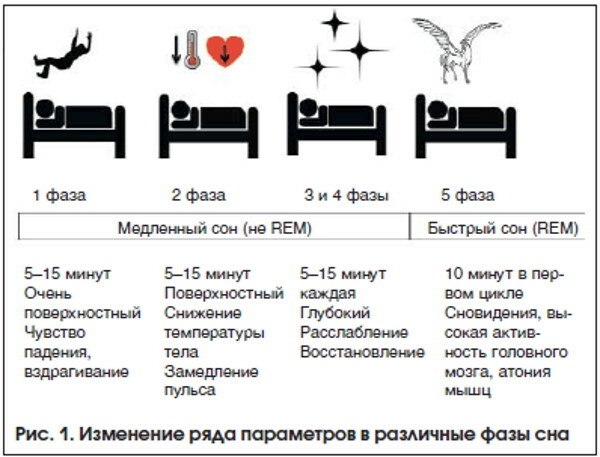
REM sleep is characterized by vivid and memorable dreams. At this time, the muscles of the whole body are relaxed as much as possible, which makes it impossible to act out dreams in the real world.
All 5 phases are one cycle of full sleep, the duration of which varies from 100 to 120 minutes.
What happens in the body during sleep
Sleep has many different and useful functions.
In addition to general relaxation, it can have the following effects:
- maintaining human health;
- renewal and restoration of nerve cells;
- elimination of toxic substances that affect the nervous system;
- restoration of brain function;
- acceleration of the regeneration of damaged tissues - wounds, injuries and other injuries;
- strengthening the immune system;
- restoration of the general tone of the body.
When sleep is poor, restless, or frequently interrupted, some functions are impaired. This affects the psychological, physical and emotional state of a person.
At the same time, there is a decrease in the production of some hormones (for example, growth hormone in children), which can lead to developmental delay.
How much sleep a day, depending on age, at what time
According to accepted standards, the duration of sleep for an adult should be 8 hours. However, the data of the indicator are generalized, since much depends on the physiological characteristics of a person and the presence of fast and slow sleep phases.
This also takes into account age and genetic differences. Thus, people with mutations in the DEC2 and ABCC9 genes may need only a few hours to rest without any consequences for the body.
| Age | Recommended duration of sleep | Inadmissible norms |
| Newborns up to 3 months | 14 to 17 h | Less than 11 and more than 19 hours |
| Children from 4 to 11 months | 12-15 h | Less than 10 and more than 18 hours |
| Children from 1 to 2 years old | 11-14 h | Less than 9 and more 16 hours |
| Children 3-5 years old | 10 to 13 h | Less than 8 and more 14 hours |
| Children from 6 to 13 years old | 9-11 h | Less than 7 and more 12 hours |
| Adolescence from 14 to 17 years old | 8 to 10 h | Less than 7 and more than 11 hours |
| 18 to 25 years old | 7-9 h | Less than 6 and more than 10 hours |
| 26-64 years old | 7 to 9 h | Less than 6 and more than 10 hours |
| Over 65 years old | 7-8 h | Less than 5 and more than 9 hours |
Sleep neuroanatomy
Why a person needs sleep and how exactly it works can be understood if you first study the neuroanatomy of this process. The hypothalamus contains a whole network of neural connections that are responsible for the duration of sleep and its presence as such.
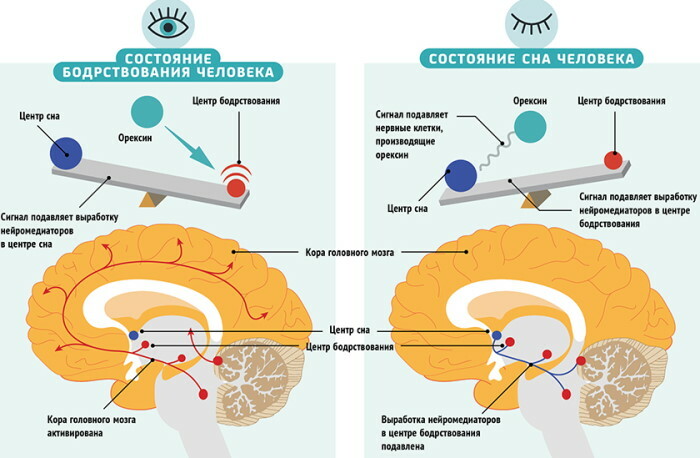
The following structures are responsible for slow sleep:
- hypothalamus (anterior regions of the organ);
- nonspecific nuclei of the thalamus;
- nuclei responsible for the production of serotonin (suture nucleus);
- brake area Moruzzi.
The following areas are responsible for the REM sleep phase:
- blue spot;
- vestibular nuclei located in the region of the medulla oblongata;
- centers that are responsible for the rapid movement of the eyes;
- upper sections (colliculus), located in the midbrain region.
The night rest cycle is regulated by the blue spot and some parts of the cortex of both hemispheres.
What affects sleep?
There are many different factors that affect sleep - quality, duration, phases.
Age-related changes in sleep
As we age, the quality of sleep decreases and the duration of sleep decreases. If in the middle of life, a person needs 7-8 hours of night rest, then for people over 65-70 years old, 5-6 hours is enough.
This rhythm does not require treatment and is not considered a pathology. In the daytime, the number of short dreams increases, at night the duration decreases.
Since daytime physical activity in older people is reduced, less time for rest and energy storage is required.
At the same time, the duration of sleep can also be reduced for various diseases or abuse of sedatives, which can, with prolonged use, lead to the opposite effect.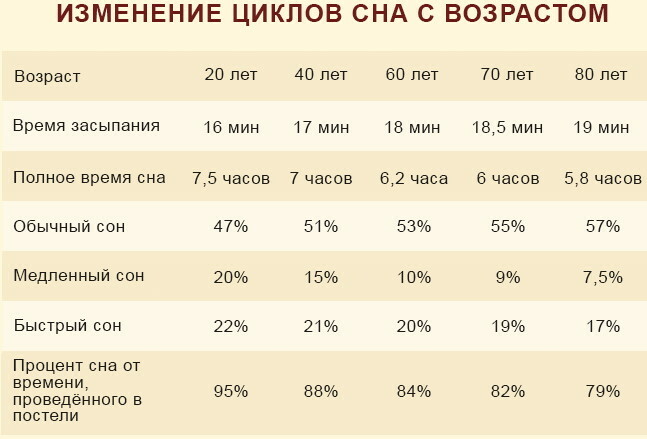
Psycho-emotional disturbances, which are common in older people, can also lead to a reduction in the period of night rest.
Artificial lighting
Artificial lighting and light from household appliances (TV, computer monitor, floor lamps) can influence cicadian rhythms that synchronize with the environment through light and darkness.
Ultraviolet blue waves are needed to boost mood, alertness, and improve cognitive performance.
With the onset of darkness, the pineal gland begins to actively produce metelatonin, which indicates that it is time for sleep. Blue waves emanating from artificial light block the production of this substance, which leads to disruption of normal rhythms.
It is impossible to completely exclude such important household items, so special glasses have been developed to block blue waves.
Also, for computers or other gadgets, special software is produced that allows blocking the action of blue light waves in the evening.
Sleep hygiene
How sleep works and why it is needed are told by scientists who have different visions and concepts of the process. In addition to the basic concepts, it is useful to know how to make it correct and useful. Sleep hygiene refers to the management of various factors that affect the duration and quality of sleep.
These factors include:
- External circumstances and priorities. Many people become hostages to external circumstances, such as watching movies at night, chatting on social networks, and caring for a child. All this leads to a violation of the rhythms of sleep-wakefulness.
- Schedule. It is recommended to lie down and paste at the same time.
- Light. In the room where the person sleeps, there should be a complete lack of light. For this, it is best to use blackout curtains or special sleep masks.
-
Sound. The bedroom should be soundproofed to prevent the presence of extraneous sounds. Otherwise, it is recommended to use earplugs.
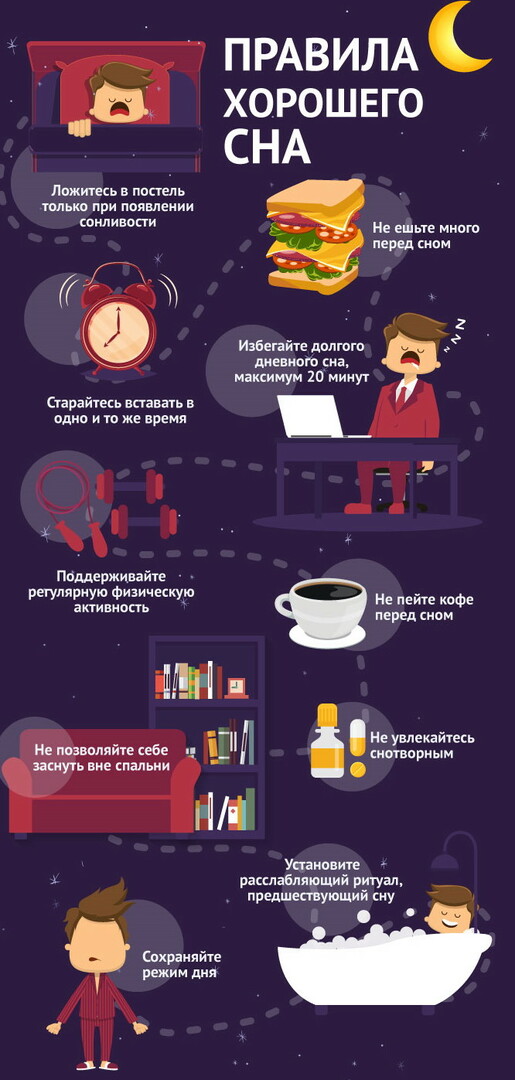
- Temperature. The optimal and comfortable temperature for sleeping is 18-22 0C.
- Food intake. It is not recommended to go to bed on a full or empty stomach. The last meal should be 2-3 hours before bedtime. Later than 3-5 hours before going to bed, it is forbidden to drink coffee and other energy drinks.
- Relaxation. Warm baths with sea salt or essential oils are a great way to relax and help you fall asleep faster.
- Bed. Correct posture and comfortable bedding will help you relax and fall asleep faster.
Compliance with these recommendations will make sleep more comfortable, help a person get enough sleep and recover after a hard or hard day at work.
Effect of sleep on vital functions
The quality and duration of a night's rest has an impact on a person's daily life.
Sleeping off on weekends
Studies carried out by Swedish scientists have found that the risks of death are the same for those who slept for 7-8 hours a week and those who slept on the weekend.
However, people who slept less than 5 hours a day showed signs of high blood pressure and cholesterol. At the same time, these patients significantly increased the risk of insomnia.
The short duration of night rest during working hours of the week also led to an increase in the risks of the following violations:
- headache;
- chronic fatigue;
- overweight;
- cardiovascular diseases;
- strokes;
- heart attacks.
Disruptions in sleep cycles lead to an increase in the concentration of the hormone hunger (ghrelin) and a decrease in leptin levels, which, in turn, induces appetite. These studies were conducted in both animals and humans.
Sleep deprivation
Deprivation means loss, deprivation, or reduction in sleep. The complete lack of sleep is a serious condition, which is accompanied by a loss of clarity of consciousness with periodic clouding and falling asleep.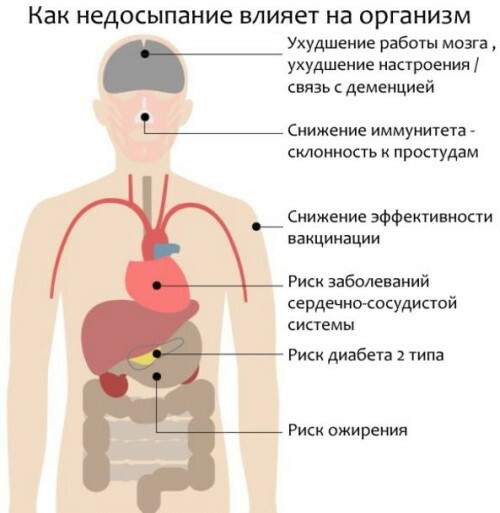
This condition significantly increases the risk of developing diabetes mellitus, leads to disruptions in blood pressure and causes other symptoms similar to paranoia and psychosis.
Ultimately, prolonged sleep deprivation can lead to death.
Labor productivity
Every person should know how sleep works and what it is needed for, which will allow you to use it effectively and profitably. Studies have confirmed the relationship between sleep duration and labor productivity. Constant sleep deprivation leads to cognitive impairment and has a cumulative effect.
With a regular, normal sleep-wake cycle, labor productivity is maintained at the same level.
Studies have shown that the reproduction of sound signals of a certain tonality and intensity for several seconds also led to disruption of sleep cycles. In this case, the experiment was carried out both with partial falling asleep of the experimental, and with full immersion in a dream. All changes were recorded using EEG.
The results were displayed on the monitor in the form of changes in brain activity.
What are sleep pathologies and how to deal with them
There are several disorders related to the quality and duration of sleep:
-
Dyssomnia - sleep disorders, including insomnia. The reasons for the development of such a condition can be various neurotic and psychosomatic diseases, psychosis or organic brain damage.
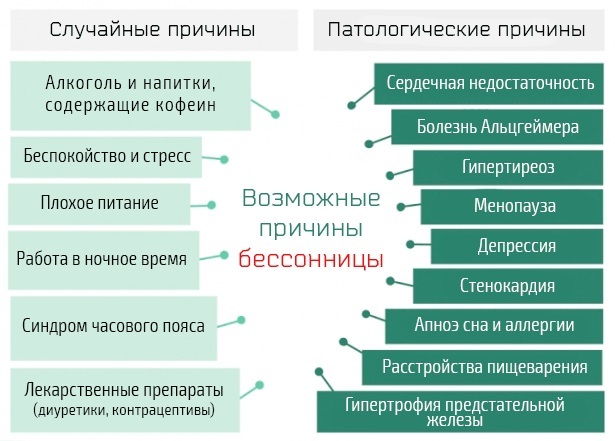
- Sleep apnea - violation of breathing during sleep (stop followed by resumption).
- Hypersomnia - sleep disorders, characterized by an irresistible desire to sleep. Such conditions occur with lethargic sleep or narcolepsy.
- Parasomnias - active manifestations of a person during sleep. Such disorders include: sleepwalking, nightmares, teeth grinding, epileptic seizures.
- Sleep paralysis - lack of motor ability before falling asleep or after waking up.
As a rule, these disorders can occur as a result of various diseases, including mental ones. Treatment of pathologies is carried out in a complex manner with the use of drugs (antidepressants, antipsychotics, sedatives), depending on the nature of the origin of a particular disorder.
It also requires mandatory consultation and treatment with a psychotherapist.
With organic brain damage, appropriate complex therapy is prescribed.
A person needs sleep for proper rest and recovery of the body, so every person needs it. To make it more comfortable and useful, you should study how it works and what exactly needs to be done in order for it to be of maximum benefit.
Sleep videos
About the nature of sleep:

